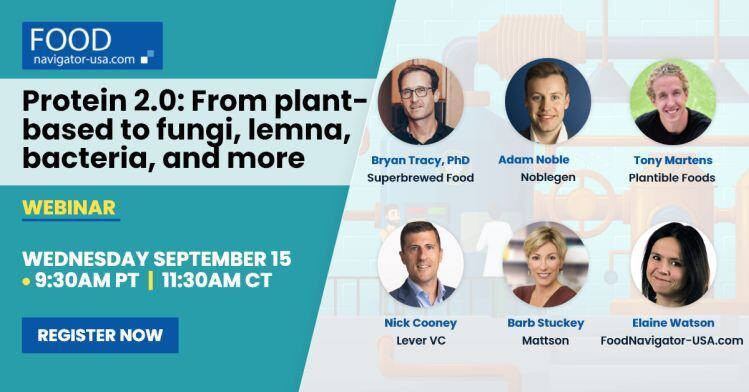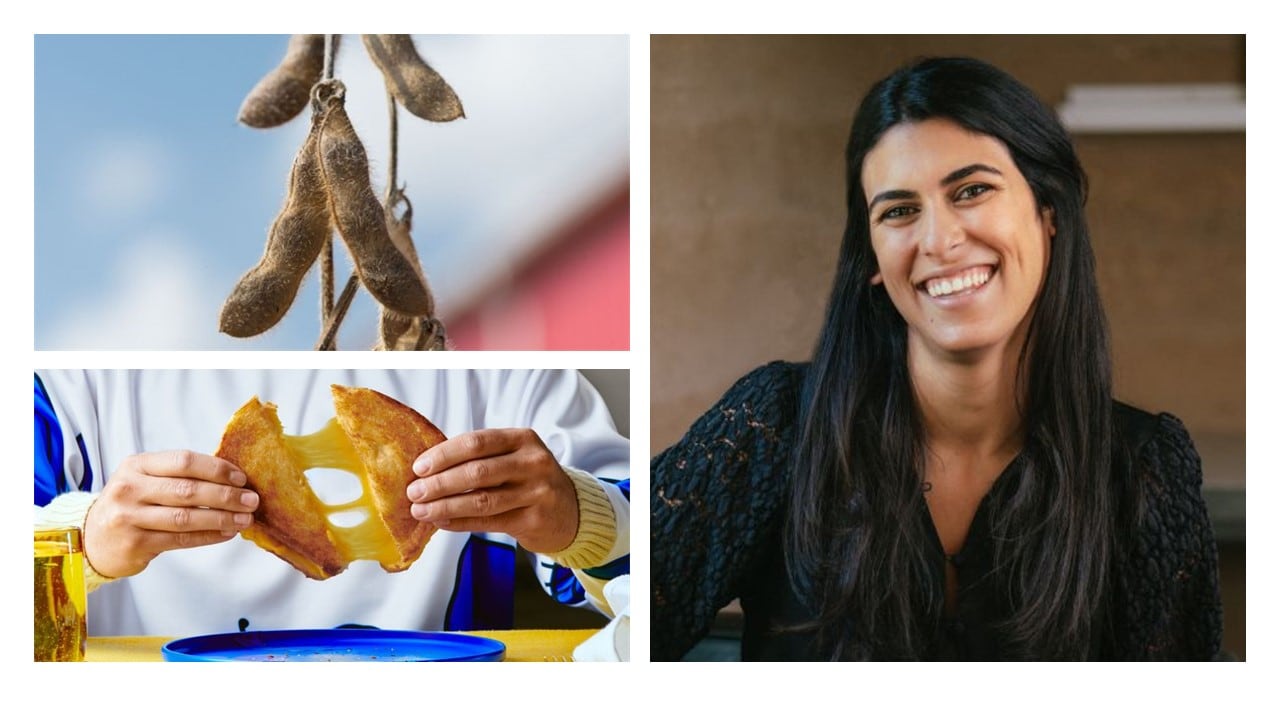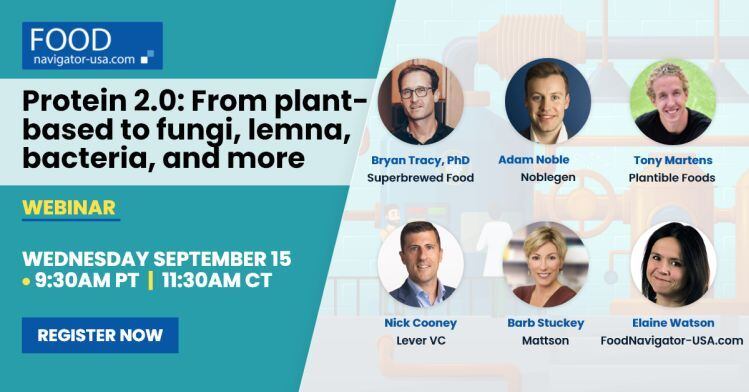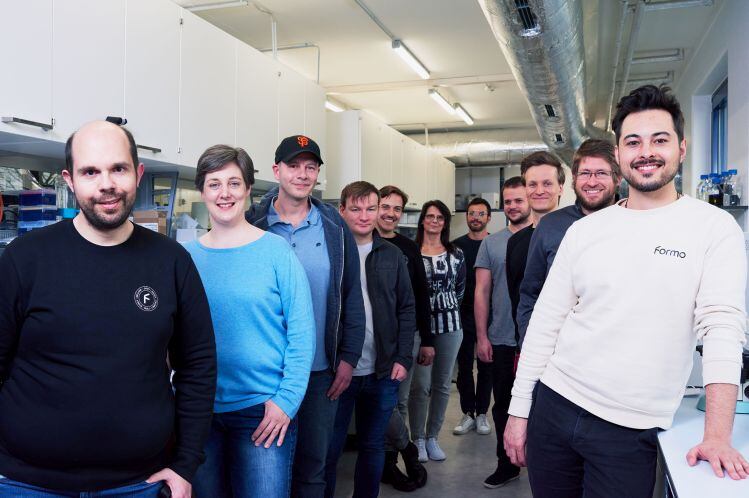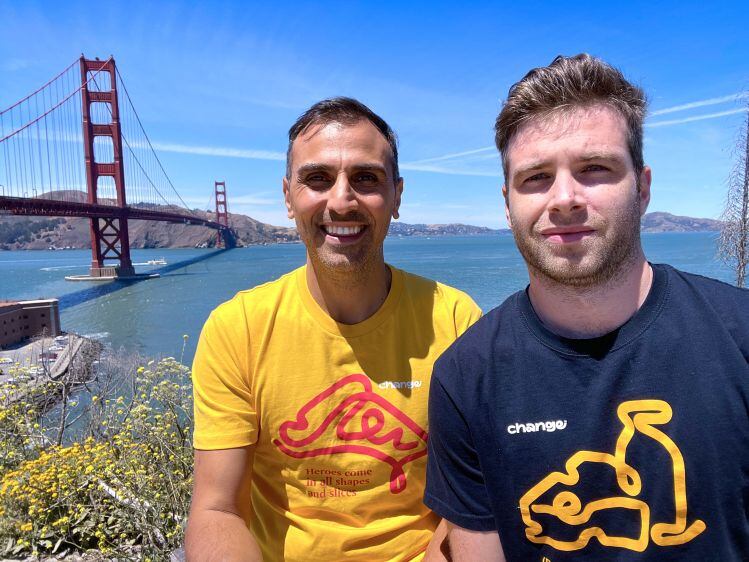On paper, microbes might seem to have the edge over plants and animals from an efficiency perspective as they multiply fast in the right conditions, while R&D development cycles are much shorter (stakeholders can determine pretty quickly if fungi or yeast cells will produce animal proteins instead of waiting months for soybeans to grow before learning if they have to go back to the drawing board).
In practice, however, what matters is how scalable your technology is, says Nobell Foods founder and CEO Magi Richani, who has just raised $75m in a series B round* to fund her patented process to genetically engineer soybeans to produce casein so she can make cheese that behaves like dairy cheese… without cows.
‘The beauty of plants is that they are already efficient at making protein’
You can grow yeast, algae, bacteria or fungi very rapidly, says Richani, who plans to launch cheeses on a small scale to the public by the end of next year.
But once you get to a certain scale, it can be challenging and expensive to keep your bioreactor sterile, maintain oxygen levels throughout the vessel, dilute toxic byproducts, and keep nutrients mixing without killing your microbes, which you have to watch don’t mutate as the environment changes, she said, noting: "Casein is an inherently difficult protein to express, so the yields are low and the cost structure is high."
Plants, by contrast, take longer to grow, she acknowledged, but once you’ve nailed the process, scaling up is easy: You just plant more seeds. Plus, there is already an established infrastructure to grow and process soybeans.
"Basically, our mission is no different from other companies in our space,” Richani told FoodNavigator-USA. “Our reliance on animals for food is just not scalable and sustainable and we need to find better ways to feed people.
“But in order to have an impact, we've been very focused on technologies that give us the cost structure we're looking for and if we're going to be able to compete with the artificially low [subsidized] price of dairy proteins, we need to be able to have cheaper technologies.
“The beauty of plants is that they are already efficient at making protein, and soy is the cheapest form of plant protein on the planet,” said Richani, a San Francisco-based civil engineer who built a career at oil giant Shell in project management before departing to set up her own business in 2016 (originally called Alpine Roads).
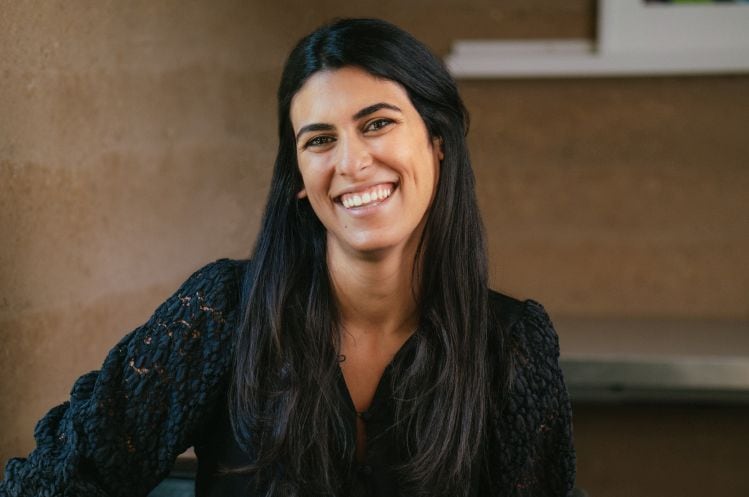
Nobell runs tests in parallel…
As for the R&D process, while it takes longer to grow soybeans than microbes, you can test multiple plants concurrently, rather than waiting several months and then starting all over again, she pointed out.
“Between the time we design an experiment, and we get our data, it's a six-month process, so we have to run many things in parallel as we don't have the luxury of rapid iteration. So, between 2016 and now, we've had so many iterations. We took the longer road, but we knew that from day one.”
Is Nobell Foods making all types of casein protein?
But what kinds of dairy proteins can Nobell Foods make from soybeans, and are they exactly the same as proteins produced by cows?
When casein molecules are formed in cow’s milk, for example, they fold up into a spherical ‘micelle’ structure in which casein proteins – alpha 1, alpha 2, beta, and kappa - are suspended in a solution along with calcium and other minerals.
“Absolutely, we can make all four casein proteins,” claimed Richani, “but for our cheeses, we discovered that we don't actually need all four of them. We put a lot of effort into understanding each of their individual properties and we actually can get 90% of the way with just one of them, so we’re focusing on one or two.”
‘We’re not reinventing the wheel -- 90% of the infrastructure is already there’
While you have to extract the proteins from the beans once they are harvested, she said, there is already an established infrastructure for growing and processing soybeans, and there is already a market for the other parts of the bean (fats and regular soy proteins).
“We’re not reinventing the wheel -- 90% of the infrastructure is already there. Right now there are two main methods [for processing soy]: The first is for soy milk and tofu, and the other is solvent extraction for protein concentrates and isolates, where you crush the soybeans, remove the oil, and end up with the protein and the carbohydrates and then separate the proteins out.
“We can plug into either of these processes.”
The B2C business model: ‘When you come up with new technologies … messaging is so important and we believe we cannot outsource that to third parties’
So, what business model makes the most sense for Nobell Foods?
While it could go down the b2b route (as Perfect Day did initially for its animal-free whey proteins produced via microbial fermentation), being in control of the messaging at a consumer level has certain advantages when you’re introducing the world to a new technology, said Richani, who is going down the b2c route.
“When you come up with new technologies and new ways of doing things, messaging and packaging are so important and we believe we cannot outsource that to third parties. We need to be ones shaping the narrative and talking to the people that are going to buy our products directly.
“Nobell Foods is a CPG company, a brand, we're going to sell our products under our own brand, we are going to communicate and talk directly to the people that are buying our products.”
In the longer term, she said, “there could be opportunities for us to license or partner or sell under different brands or with other CPG companies and I think that is going to be important because they already have scale and access to consumers.”
It's casein made by plants… but could consumers be confused if you call an animal protein (and dairy allergen) 'plant-based?'
When it comes to messaging, Nobell Foods’ technology presents unique challenges, she acknowledged, because it is making animal proteins (casein)… from plants. And while it may be technically accurate to describe its cheeses as ‘plant-based’ (which many media outlets have done), there is clearly potential for confusion given that they contain dairy allergens.
Richani is not yet convinced that ‘animal-free’ is the best way to describe this new wave of products either, however.
“We’ve been having a lot of internal conversations about this because we have seen the confusion that's out there, right? These products contain an allergen, so there should be no room for confusion about that, but at the same time, they do not come from an animal, so we're all going to have to work really hard to figure out how to explain this.”
‘We want to be as transparent as possible’
She’s also not massively keen on the term ‘molecular farming,’ a somewhat euphemistic term deployed by the media to report on firms such as Moolec Science, which is also genetically engineering crops to produce bovine proteins: “It’s not very approachable.”
When it comes to genetically engineered crops, she said, “We want to be as transparent as possible. I think our job is not to hide what we're doing; our job is to explain why it's beneficial and why we need it, and why these tools such as genetic engineering are important to create a future that is going to be more sustainable.”
On the regulatory front, growing the animal proteins (which are familiar and already in the human food supply) in fields from GM crops (as opposed to GM microbes in fermentation tanks) means that the USDA as well as the FDA is involved and Nobell Foods is working closely with both agencies, she said.
Small scale launch by the end of next year
So, what happens next?
“A couple of things,” said Richani. “We need to scale our plants and go from greenhouses into field production, and then scale manufacturing from pilot to manufacturing scale for the product that we're making.
“So the next 18-24 months are really focused on scale up, so we’re looking at producing cheddar or mozzarella by the end of next year on a small scale.”
Beyond casein
She added: “The second piece is going to be expanding the R&D platform as the technology we’ve developed to produce dairy proteins in plants has also taught us how to make other [animal] proteins in a more efficient and sustainable and eventually cheaper way.”
* Nobell Foods has raised $100m in funding cumulatively. Its latest series B round was backed by Andreessen Horowitz and Bill Gates-backed Breakthrough Energy Ventures, with notable support from Robert Downey Jr.’s FootPrint Coalition Ventures. Others joining the round include Unovis, Germin8 Ventures, Fifty Years, AgFunder, Pear VC, GL Ventures, the venture capital arm of Hillhouse Group, and Mission Bay Capital.
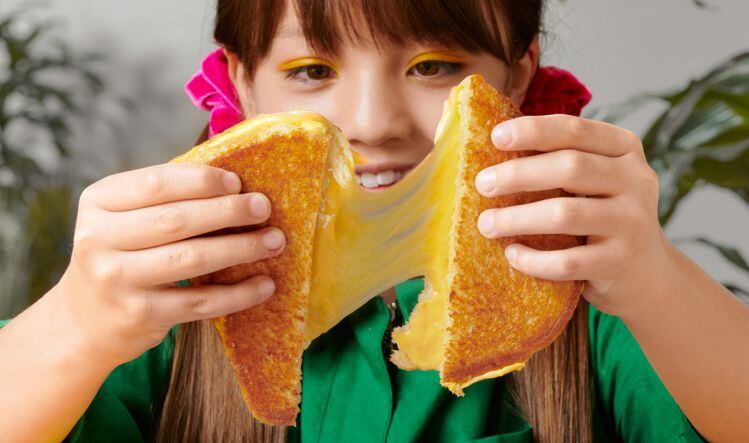
Interested in the next generation of food proteins?
Check out our FREE webinar on September 15: Protein 2.0: from plant-based to fungi, lemna, bacteria, and more...
In our debate, moderated by FoodNavigator-USA editor Elaine Watson, we’ll discuss:
- Protein potential: Assessing the market opportunity for plant-based and ‘alternative’ proteins
- The investor perspective: How are investors viewing the protein landscape?
- Yield and sustainability: What’s the greenest, most efficient way to make high-quality food protein?
- Comparing proteins: Taste, performance, nutrition
- Consumers and next-generation proteins: Labeling, marketing
